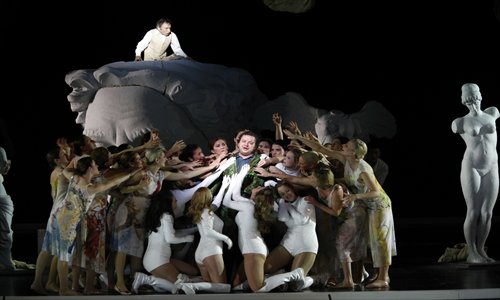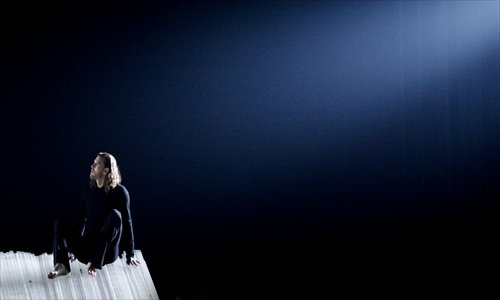Warming up to Wagner



Parsifal premieres in China with a postmodern rendition of the Wagner opera. Photos: Courtesy of the Beijing Music Festival
In the bicentennial year of Wilhelm Richard Wagner (1813-83), the premiere of the great German composer's last work, Parsifal, comes to China for the first time.
The co-production by the Beijing Music Festival (BMF), Salzburg Easter Festival, Sächsische Staatsoper Dresden and Teatro Real from Madrid first showed at the Poly Theater on Tuesday, and the second performance will grace the stage tonight.
"The premiere will be remarkable in the musical history of China," said Yu Long, director of the artistic committee of BMF, at a press conference before the performance.
On Tuesday, the curtain call for the immense production lasted for 10 minutes - strong evidence that Wagner's shining moment in China has finally arrived.
Postmodern premiere
The three-act Parsifal has been steeped in controversy since its inception. Based on the Middle Ages legend of the Holy Grail, it is considered the pinnacle of Wagner's creative life by many critics not only for the grand-scale musical treatments, but also the philosophical content of the libretto.
This production of Parsifal comes from the Salzburg Easter Festival and differs from traditional versions. As director Michael Schulz explained, the postmodern style can clearly express the tugs of temptation felt by the characters and draw audiences into the dramatic conflicts.
The set design in particular catches the eye. On the stage in the first act stands a labyrinth of transparent pillars that are filled with smoke and saturated with color.
"I use pillars to represent a forest and a church in a metaphorical way," Schulz said. "The reflections on the pillars help to express the nightmarish seduction that takes hold of the characters."
In another unique element of this production, clusters of dancers follow the lead male and female characters to present the conflicting forces playing on them, including temptation and redemption.
Schulz admitted that the show might not be easy to understand, but he suggested audiences jump right into the drama from the moment the first note plays.
"The postmodern style is a very stylish way of presenting Wagner worldwide," said Ke Hui, the secretary of a Chinese committee of Wagner aficionados. "The Chinese audience is very lucky in having the chance to watch Parsifal performed by top-class musicians."
Die-hard fans
Though many new concepts are added into the already-complex opera, Yu said he thinks this performance will please Wagner's Chinese fans.
"We've seen that in previous premieres of Wagner's other works that Chinese fans are so enthusiastic about this composer," Yu said. "For this performance, many in our audience traveled a long way to enjoy Parsifal."
With two extended intermissions of 45 minutes and 30 minutes, the Chinese premiere of Parsifal lasted nearly six hours and ended after midnight. Yu suggested audiences come to the performance with full stomachs.
Wagner's real fans came well-prepared. Some in the audience booked hotel rooms near the theater to spend the night after the show, and some brought inflatable pillows for the long periods of sitting.
A fan named Sanxi posted on social media, "It is physically exhausting to watch Wagner's opera, but the feeling of celebrating a festival is fairly good!"
Ke, now a member of the China branch of Richard-Wagner-Verband International as of June this year, established a local group for Wagner lovers.
"We are ready to prepare more communication between Chinese Wagner lovers around the world," Ke said.
He told the Global Times that many of his friends are so addicted to Wagner that they started to study German and research the stories and legends told in his operas.
"As the person with the most biographies in the world just following Jesus Christ and Napoleon, Wagner for us is much more than a composer," Ke said. "And with so many Western scholars and leaders so interested in Wagner, he could be a key for us to understand Western culture."
For this performance, Ke helped BMF obtain translated scripts from Tang Yichang, a Wagner specialist from Taiwan.
"Western opera audiences have been already familiar with Wagner and many were deeply influenced by him, but for many Chinese audiences, they are still watching some Wagner operas for the first time," said Ke. "Seasoned classical music fans want to taste the nuances of the live performance rather CDs, so the premieres of Wagner's works in China are especially precious."
Decades of silence
Just as Ke said, Wagner wasn't well known in China. Wagner was mentioned by some modern writers in the 1920s, especially those who had studied abroad. Xu Zhimo wrote a poem in 1923 describing his feelings while listening to Wagner's work. Another poet, Guo Moruo, mentioned Wagner as one of the most influential Western composers.
Wagner's "Bridal Chorus" became common in more affluent circles, but still, few Chinese knew much about the composer before the 1980s.
That's when Wagner first became an entry in the Encyclopedia of China. Yan Baoyu, a professor from Peking University, was invited to write the entry. Yan recalled in a preface he wrote for a book about Wagner that, for a very long time, Chinese scholars fretted too much over Wagner's anti-Semitism (he was favored by Adolf Hitler) and ignored his thoughts against capitalism. So for a very long time, though many musicians knew about Wagner's talent, none of his work was performed in China.
"I hoped that I could introduce Wagner to China eventually, first through writing about him and then through his music," Yan wrote. His dream from that time soon came true.
In 1987, a biography of Wagner by German writer Hans Mayer was translated and published in China, which was considered by Zhu Wei, chief editor of Life Week magazine, as the best biography of Wagner. In the 1990s, an increasing number of scholars and writers began posting articles, gradually introducing Wagner's work to the public.
The premiere of The Flying Dutchman in Macao and Shanghai in 1999 finally ended the silence. After that, a flurry of Wagner's works came to China. The whole script of Der Ring des Nibelungen was first performed at BMF 2005, divided into four parts presented over four days, and became a legend - also helping Wagner's name to become more commonplace.
In contemporary weddings mixing Eastern and Western customs, his "Bridal Chorus" still plays during that exciting and touching moment. So perhaps for many Chinese, Wagner is not so removed.